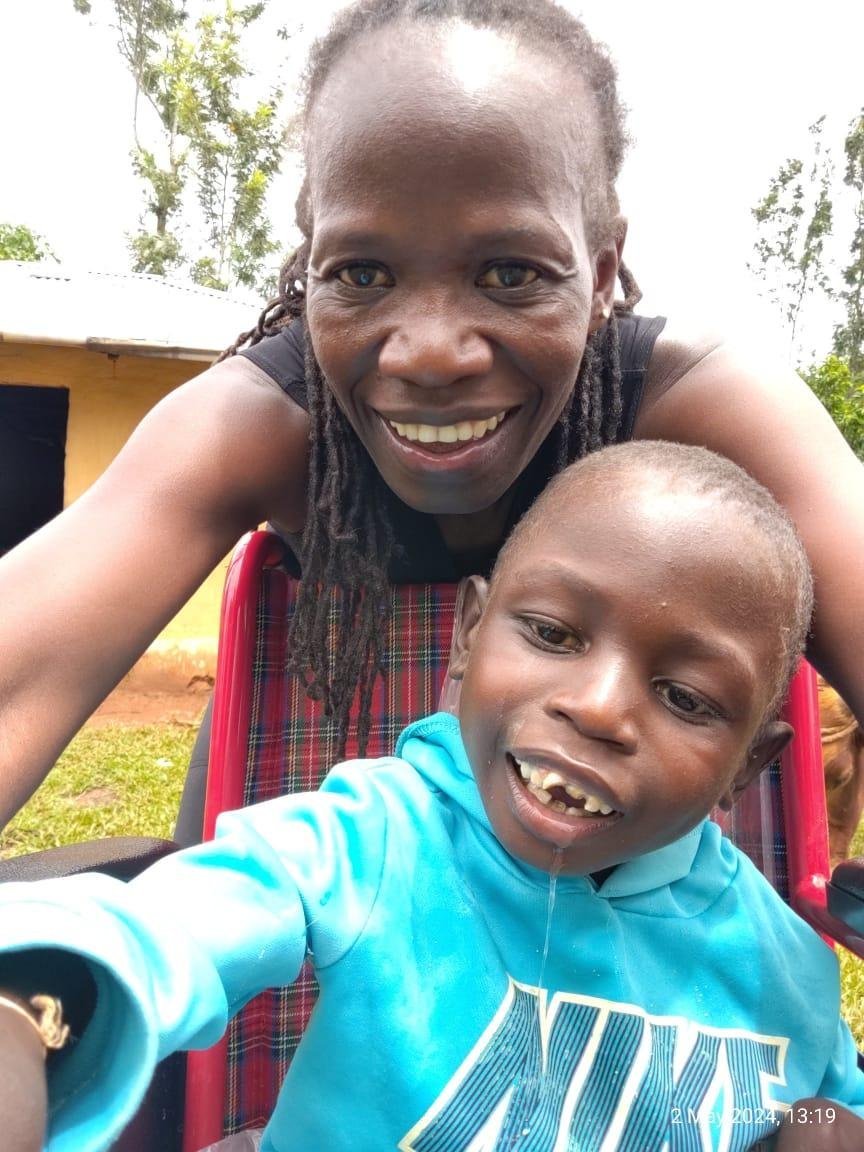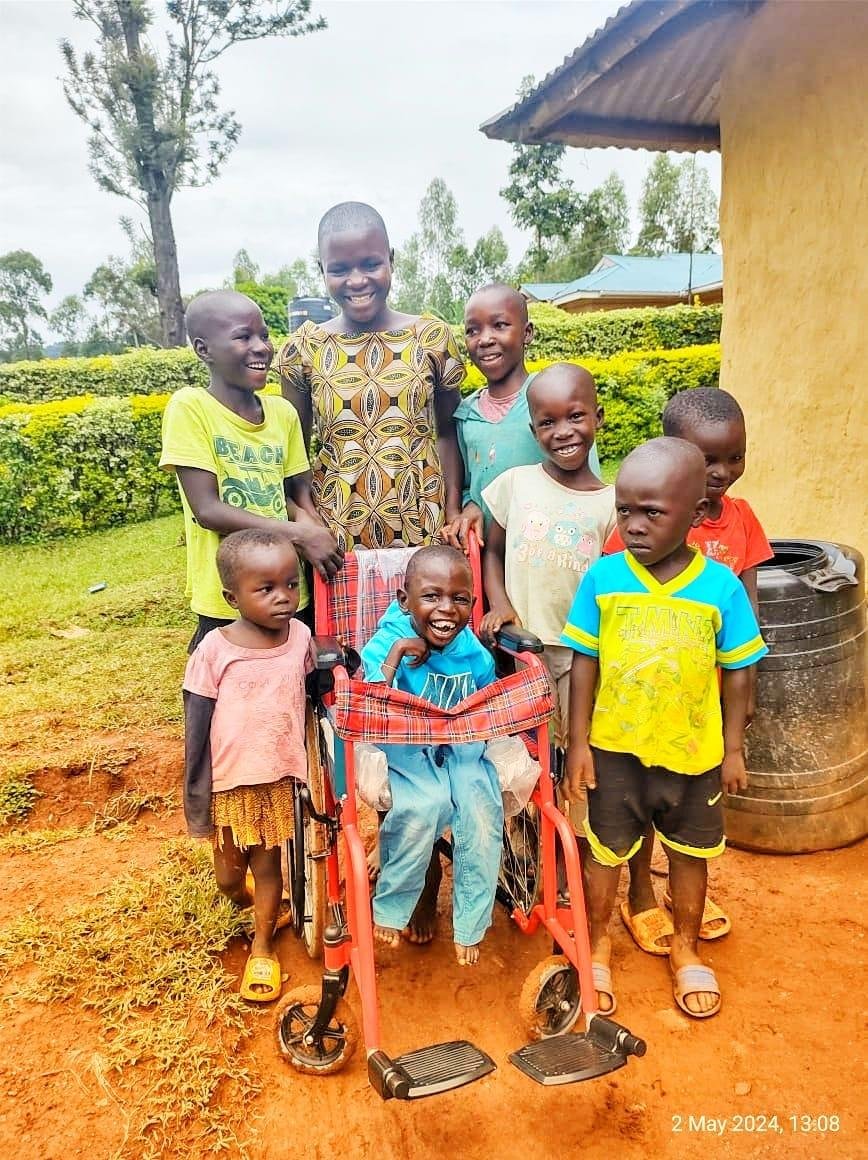Meet Clinton: from plastic chair to wheelchair
The Principal of CES’s Continuing Education program has a side-venture – providing wheelchairs to children in her community who need them. Here’s a report Patricia sent, talking about helping a young person named Clinton.
—————-
THE TRANSFORMATION FROM THE KID’S PLASTIC CHAIR TO THE KID’S WHEELCHAIR WAS A HEARTWARMING EXPERIENCE.
BENEFICIARY DETAILS:
Name: Clinton Otieno Kola
Age: 14 years
Father’s Name: Dancan Kola Odenyo
Mother’s Name: Irene Akinyi (She was not at home, she had gone to work)
Residential Place: Both reside at Ojwando, about 100 km west of Kakamega
Profession: Clinton’s father is a casual laborer, and his mother works as a cleaner at a slaughterhouse.
Clinton in his brand-new kid´s wheelchair
INTRODUCTION:
Making the decision to step out of one’s comfort zone and visit homes or hospitals can be challenging. Some people assume that such visits involve giving money or material things. However, for me, happiness lies in assisting those in need within the community, whether socially or by sharing what little I have. Through these interactions, we learn about others’ lives, their struggles, and the small gestures that can motivate or bring a smile. It’s a reminder that we’re not alone in facing life’s hardships.
MEETING CLINTON:
When I first laid eyes on Clinton, my heart melted. Someone had recommended him to us, knowing he deserved a wheelchair that would significantly impact his life and that of his parents.
Clinton, the third-born in a family of seven, was only 14 years old. We expected to see a wellbuilt boy who could perhaps move around despite physical mobility challenges. However, reality surprised us.
As we entered Clinton’s home, his father introduced us to his son. With lovely eyes and a warm smile, Clinton sat on a kid’s plastic chair. We shook hands, prayed together, and sat down. His tiny frame made us wonder if he was truly 14 or if there had been a mistake.
Clinton welcoming us
SCHOOLING
Introduction to kindergarten: Clinton was introduced to kindergarten at the age of four. However, due to frequent illness, his attendance was inconsistent.
Diagnosis of sickle cell anemia: At age five, he was diagnosed with sickle cell anemia at a local hospital in Oyugis.
Clinton on his kid´s plastic chair
TREATMENT
Blood transfusions: Clinton’s treatment began immediately with blood transfusions.
Unfortunately, there was minimal improvement. His hands started to shrink, his tongue became heavy, and he could only consume semiliquid food. Simultaneously, his legs grew thinner. Frequency of blood transfusions: Clinton’s father informed us that he has received blood transfusions 15 times. Initially, he received blood thrice a year, but now it’s once a year. The cost per transfusion is KSH 2500, excluding other medical expenses. Although there’s no cure for Clinton, blood transfusions manage his pain and prevent complications.
ABANDONING THE FAMILY
Responsibility and blessing: When asked why he didn’t abandon his family like other men do when their wives give birth to disabled children, Clinton’s father’s simple answer was that he feels responsible. He considers himself blessed, having six healthy children. Together with his wife and kids, they care for Clinton, viewing him as a blessing rather than a burden.
COPING WITH SICKLE CELL ANEMIA
Emotional support: Clinton’s family copes by sharing their feelings with friends from their church. They also connect with other families who have physically or mentally challenged children. This support network empowers them and reminds them that they’re not alone in raising a special needs child like Clinton.
IN CONCLUSION
How did Clinton and his family react when he saw the wheelchair?
Like a child receiving a lollipop, Clinton and his family were overjoyed when they received the wheelchair. His father, brothers, sisters, neighbors, and even strangers all gathered around, their faces lit up with happiness. They expressed their gratitude, telling me that my contribution was remarkable. The positive emotions in the room were so intense as they welcomed the newfound mobility that the wheelchair would bring to Clinton’s life.
Uncle, Father and Grandmother
Clinton Kola has challenges when it comes to speech. His resilience and ability to communicate through facial expressions despite these difficulties are truly inspiring. Certainly, the wheelchair provided for Clinton will remain to be a life-changing gift. It has allowed him now to regain mobility and independence to some level.
Happy and proud father
Happy Clinton with siblings and friends
If you want to support Patricia’s work helping special needs children, you can do so through CES. Just visit the CES website and click on the “Donate” button at the top right. Select “CES Wheelchair project” and we’ll make sure that those funds go directly to Patricia’s work.






